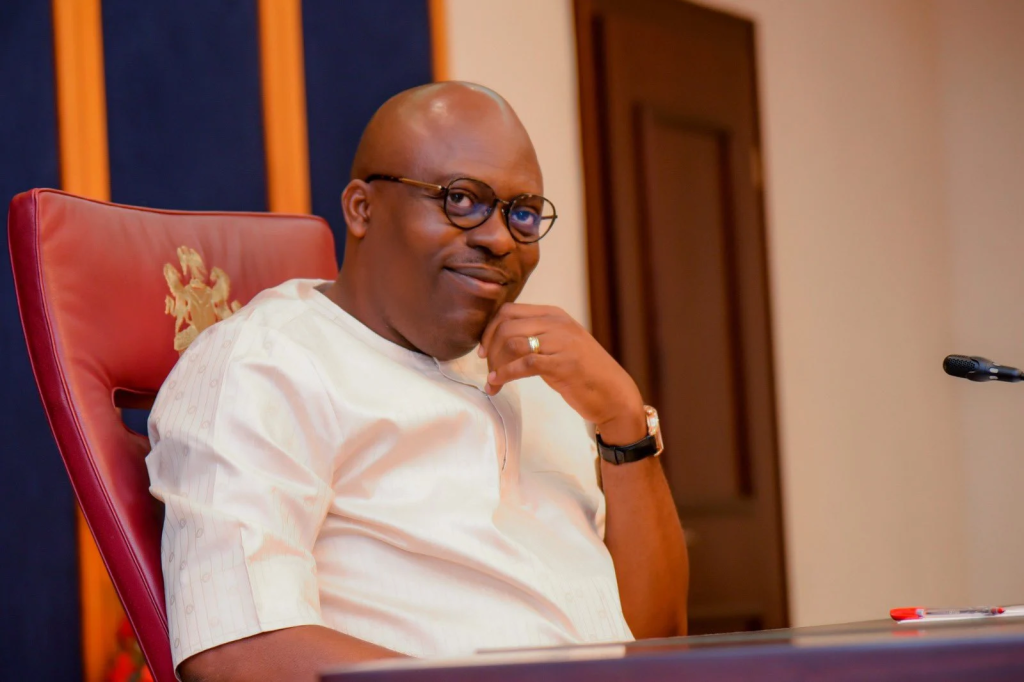Rivers: Legal action to reinstate Gov Fubara shifts to Appeal Court

By Ikechukwu Nnochiri
ABUJA–Proceedings on a legal action that is seeking to reinstate the suspended Governor of Rivers State, Siminalaye Fubara, have shifted to the Court of Appeal in Abuja.
The appellate court, in the matter that was brought before it by an Abuja-based legal practitioner, Mr. Johnmary Jideobi, is urged to determine whether President Bola Tinubu did not act in breach of the 1999 Constitution, as amended, when he suspended Fubara from office and appointed a Sole Administrator to pilot the affairs of Rivers state.
Specifically, the Appellant is praying the court to determine: “Whether in view of the combined provisions of the entirety of Sections 1, 5(2), 176(1) & (2), 180, 188, 189, 305 and 306 of the 1999 Constitution of the Federal Republic of Nigeria as amended and their conflated interpretation, the President of the Federal Republic of Nigeria has any constitutional authority [whatsoever] to either remove, suspend or otherwise tamper with the tenure of a duly elected Governor and Deputy Governor in Nigeria and appoint a sole Administrator [or any other substitute howsoever called or described] for that State?”
The Appellant’s decision to take the case before the appellate court followed persistent delays in the determination of a substantive suit he filed before the Federal High Court in Abuja.
Perturbed by the delay, he filed an ex-parte motion for the trial court to refer all the issues of law he raised in his case to the appellate court for speedy determination.
However, in a ruling he delivered on July 27, Justice James Omotosho, who is presiding over the case, dismissed the application for want of merit.
The high court held that the ex-parte application was incompetent and in breach of the fair hearing right of those that were listed as Respondents in the matter.
Cited as 1st to 4th Respondents in the case, are; President Tinubu, the Attorney-General of the Federation, the Sole Administrator of Rivers state, Vice Admiral Ibok-Ete Ibas (Rtd), and the Attorney-General of Rivers State.
In his notice of appeal, the lawyer, aside from seeking to set aside the ruling, prayed for an order, “directing the lower trial High Court to send, forthwith, the constitutional reference which the Appellant requested [by his ex-parte application] to the Court of Appeal.”
He further applied for “an order directing the Chief Judge of the Federal High Court to re-assign this suit to another Judge of the Federal High Court than Honourable Justice J.K. Omotosho for an accelerated hearing.”
Faulting the refusal of the trial judge to hands off that case, the Appellant insisted that his motion ex-parte was filed pursuant to Section 295 (2) of the 1999 Constitution, as amended.
According to him: “The learned trial Judge erred in law and refused to follow the decision of the Supreme Court when he held that the question of law which the Appellant submitted to the lower court for reference to the Court of Appeal was not such that the lower court could not determine and that it is when the question of law submitted for reference is beyond the grasp of the lower court that it would send the submitted question of law to the Court of Appeal.”
“Under Section 295(2) of the amended 1999 constitution of the Federal Republic of Nigeria, a constitutional reference could be made to the Court of Appeal in two instances; (a) when the Court suo motu decides to make the reference and (b) when a party before it requests that the reference me made [otherwise called the first limb and the second limb]
“Under the first limb [when the court makes the reference, the court “may” refer a constitutional question to the Appellate Court if it is of the opinion that the question involves a substantial question of law whereas under the second limb [when a party makes a request for the constitutional reference], the Court [obligatorily] shall refer the question to the Court of Appeal if any party to the proceedings so requests.
“The Supreme Court, in its judgments after judgments, has remained insistent in holding that while the trial High Court is not under a duty to, suo motu, refer a constitutional question to the Court of Appeal, the trial High Court is however duty bound to [willy-nilly] make the said constitutional reference where either party to the proceedings so requests,” the Appellant argued.
The plaintiff had in his substantive suit, prayed the trial court to declare that “the purported suspension of the Governor and the Deputy-Governor of Rivers State of Nigeria by the 1st Defendant on Tuesday the 18th day of March, 2025 is unconstitutional, null and void and of no legal effect whatsoever.”
He further applied for: “A declaration of this Honourable Court that the purported nomination/appointment and swearing in of Vice Admiral Ibokette Ibas (Rtd)by the 1st Defendant as the Sole Administrator of Rivers State of Nigeria is unconstitutional, null and void and of no legal effect whatsoever.
“An order of this Honourable Court setting aside the suspension of the Governor and the Deputy-Governor of Rivers State of Nigeria by the 1st Defendant on Tuesday the 18th day of March, 2025 for being unconstitutional, null and void and of no legal effect whatsoever.
“An order of this Honourable Court setting aside the nomination/appointment and swearing in of Vice Admiral Ibokette Ibas (Rtd) as the Sole Administrator of Rivers State of Nigeria by the 1st Defendant.”
As well as: “An order of this Honourable Court directing Vice Admiral Ibokette Ibas (Rtd) [the 3rd defendant herein] to vacate, forthwith, the Government House of Rivers State of Nigeria.”
Though Attorneys-General of all the 36 states of the federation were initially joined as Respondents in the suit marked: FHC/ABJ/CS/572/2025, they were subsequently delisted by the Appellant.
Meanwhile, no date has been fixed for the appeal to be heard.
The post Rivers: Legal action to reinstate Gov Fubara shifts to Appeal Court appeared first on Vanguard News.







